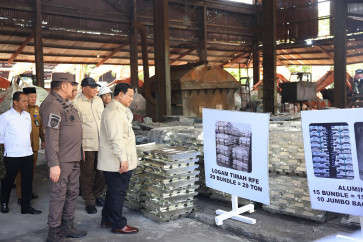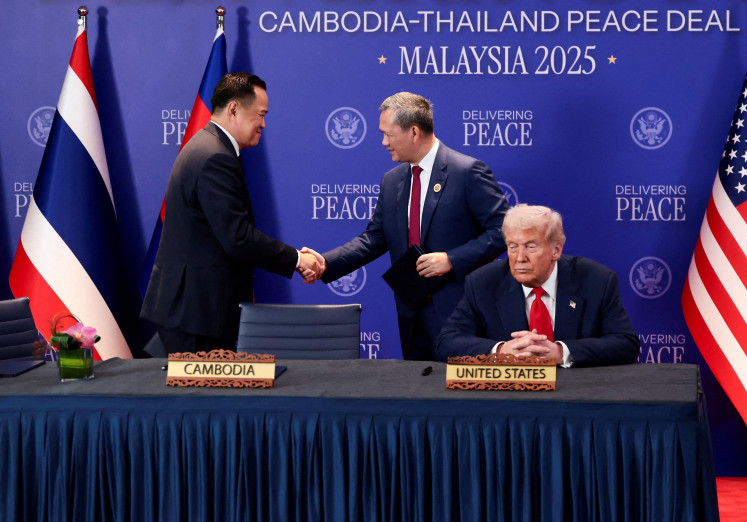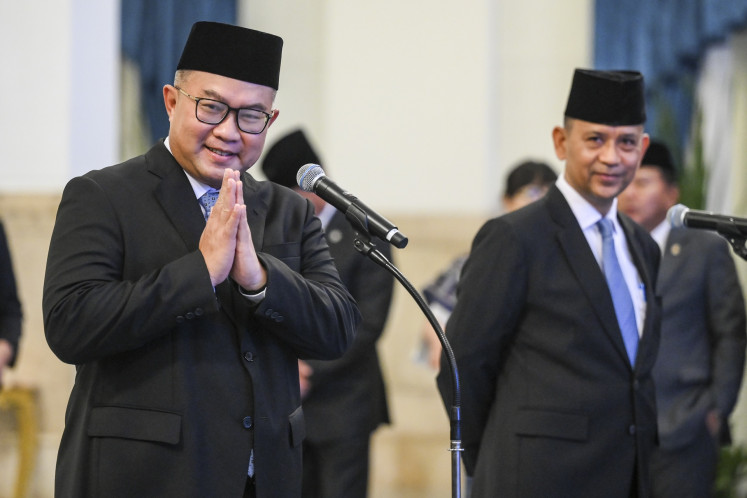Popular Reads
Top Results
Can't find what you're looking for?
View all search resultsPopular Reads
Top Results
Can't find what you're looking for?
View all search resultsRe-engagement with Kopassus
The recent announcement by Secretary of Defense Robert Gates that the US will begin “a gradual, limited program of security cooperation activities” with the Indonesian Army’s Special Forces (Kopassus) sparked an immediate controversy
Change text size
Gift Premium Articles
to Anyone
T
he recent announcement by Secretary of Defense Robert Gates that the US will begin “a gradual, limited program of security cooperation activities” with the Indonesian Army’s Special Forces (Kopassus) sparked an immediate controversy.
While the ban restricting the Kopassus from training on US soil or receive funding for lethal combat training is still likely to be in place for a while, the symbolic statement of opening formal lines of communications — beginning with “staff level discussions”— speaks louder than the actual deed.
Human rights groups from within the country and abroad were furious with this development. In their view, the Kopassus had done little to fully account for its past abuses and torture across Indonesia in the last few decades. Such impunity, they believe, means that military reform is still superficial.
On the other hand, government officials and Western pundits seem to believe that the move was a great gesture in not only beginning full, normal military-to-military relations between Washington and Jakarta, but also in deepening the two country’s strategic partnership — especially given Indonesia’s incredible democratic progress.
This partnership of course must be understood within the context of China’s growing clout, Indonesia’s geo-strategic significance for US presence in the Asia Pacific, and the rise of a complex nexus of traditional and non-traditional security threats.
Yet, while fully accounting for past violence and military abuses is a moral and strategic imperative, one should also measure the impact of the US-Kopassus re-engagement within the context of Indonesia’s defense transformation — the institutional and paradigm shift on how the military views itself, educates and trains its members, how it equips itself and how it plans to fight.
In this light, US’ Kopassus re-engagement does not seem to matter much. Three points underline this argument.
First, what the Indonesian Military (TNI) needs today — and for the next 20 years — to complete its defense transformation journey is institutional capacity building.
This includes the need to have a more, better educated civilian and military personnel that can run the defense juggernaut as efficiently and effectively as possible, while increasing indigenous technological expertise — and, of course, more cooperation with all countries, not just one, willing to help us in this quest.
In this regard, American re-engagement, if fully implemented, might potentially expose younger Kopassus officers with a better sense of professional values and expertise. And in the long-run, it might even make them better suited to adapt to Indonesia’s rapidly changing strategic environment.
But whether or not this translates into greatly improving the TNI’s overall effectiveness and readiness remains a question. This after all depends on key institutional issues such as manpower policies, education and training overhaul, and defense management reform.
Also, what good is a foreign education for TNI officers when many of the best-and-brightest are not always part of the cohort — often resulting from the fear of being shunned by their peers, or thrown off the promotion ladder upon return.
Second, while US foreign security assistance to Indonesia (mainly in the education realm) for the past 50 years have benefited both sides, the strategy and goal of the program itself needs to be evaluated and recalibrated.
The underlying theme of the International Military Education and Training (IMET) program for example, is often argued as one of the ways for the US to build relations, and even influence, within the TNI officer corps. This was at least true for much of the Cold War.
The time has come however to put aside this antiquated strategy and focus more on building the TNI’s personnel, technological and institutional capacity.
Instead of funding mid-ranking TNI officers in US military schools for example, the US could invest in sending them to civilian universities such as MIT, Harvard and other Ivy League schools in technical subjects like mechanical engineering, IT and others.
Also, training TNI officers and civilians at the Defense Ministry in key defense management subjects — over at US’ Defense Acquisition University for example — could also improve the overall management of Indonesia’s defense establishment.
Better, deeper cooperation between the two country’s military academies — the foundation of any officer corps — should also be discussed, including perhaps cadet changes, academy instructors’ training, guidebook and manual assistance, and others.
Third, one should not forget that despite prior US training, some Kopassus officers were still implicated with alleged human rights abuses.
How can we be completely sure that today will be any different? How can we know that future training of Kopassus officers in the US would improve their accountability and professionalism?
Especially when we consider that Western training for covert and special operations today are “taking a step back” with more counter-insurgency and counterterrorism nuances. Are we sure that these are subjects we want to expose the Kopassus to, especially when we wish to see the TNI play a strictly external defense role?
Bottom line, the impact of American re-engagement of Kopassus should not be blown out of proportion. It’s not “the be all and end all”.
This does not mean, however, that the TNI should simply ignore its past. Instead, full-transparency and accountability should bring the TNI closer to becoming a highly respected defense force and endear our soldiers within the public.
All of this requires a strong political commitment from the president, not just the TNI — and therein lies the heart of the matter.
The writer is a researcher with the Centre for Strategic and International Studies, Jakarta, and currently a visiting associate fellow with the Centre for Non-Traditional Security Studies, Nanyang Technological University, Singapore.










